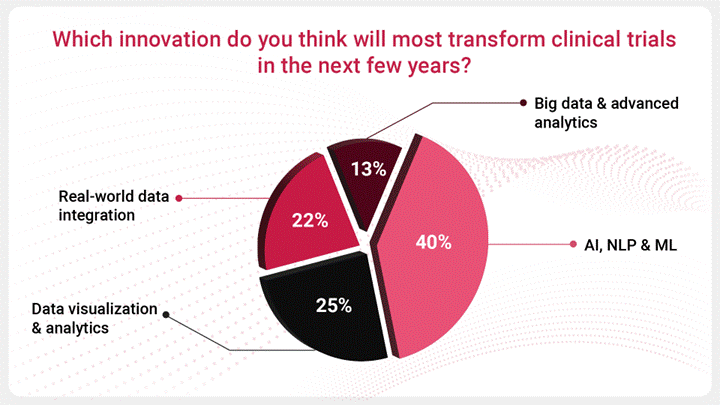The landscape of clinical trials is undergoing a significant transformation, driven by rapid advancements in technology and data science. To gauge the industry’s perspective on which innovations will most impact clinical trials in the coming years, we conducted a poll asking professionals to share their views. Here’s a summary of what we found and how these innovations might reshape the future of clinical research.
Poll Overview: What Will Transform Clinical Trials?
Our poll posed the question: Which innovation do you think will most transform clinical trials in the next few years? Respondents were given four options:
- Data visualization & analytics
- AI, NLP & ML
- Real-world data integration
- Big data & advanced analytics
Each of these innovations can revolutionize distinct aspects of clinical trials, from data management to patient outcomes. The results reflect the industry’s expectations for the future.
Key Poll Results

- AI, NLP & ML emerged as the top choice, with 40% of respondents believing these technologies will have the most significant impact on clinical trials. The ability of artificial intelligence (AI), natural language processing (NLP), and machine learning (ML) to analyze vast amounts of data, predict outcomes, and streamline processes makes them powerful tools in clinical research. These technologies can enhance trial efficiency by automating routine tasks, improving data accuracy, and enabling more personalized treatment strategies.
- Data visualization & analytics followed, securing 25% of the votes. The growing complexity of clinical trial data demands sophisticated visualization tools that can turn raw data into actionable insights. Advanced analytics and visualization platforms help researchers and stakeholders understand trends, identify potential issues early, and make data-driven decisions, leading to better trial outcomes.
- Real-world data integration was selected by 22% of respondents as a key innovation. Integrating real-world data (RWD) into clinical trials can provide a more comprehensive understanding of patient populations and treatment effects. By leveraging data from electronic health records, wearable devices, and other real-world sources, researchers can design trials that are more reflective of actual patient experiences, leading to more relevant and impactful results.
- Big data & advanced analytics garnered 13% of the votes. The sheer volume of data generated in clinical trials is increasing exponentially. Big data technologies and advanced analytics are essential for managing, processing, and extracting valuable insights from these massive datasets. These tools can help identify patterns, optimize trial designs, and support decision-making processes.
What These Results Mean for the Future of Clinical Trials
The poll results clearly indicate that AI, NLP, and ML are expected to lead the charge in transforming clinical trials. These technologies, combined with advanced data visualization and the integration of RWD, can create a more efficient, accurate, and patient-centered approach to clinical research.
As these innovations continue to evolve, we can expect to see a shift towards more adaptive trial designs, faster and more reliable data analysis, and an overall improvement in trial outcomes. The integration of RWD will further enhance the relevance of clinical trials, ensuring that treatments are tested in environments that closely mirror everyday patient experiences.
Conclusion
The future of clinical trials is bright, with technological innovations poised to drive significant advancements in how trials are conducted, analyzed, and applied to real-world settings. As we continue to embrace these technologies, the potential for more effective, efficient, and patient-centric trials becomes increasingly attainable.
Ready to take the next step and explore how these technologies can benefit your clinical research?



